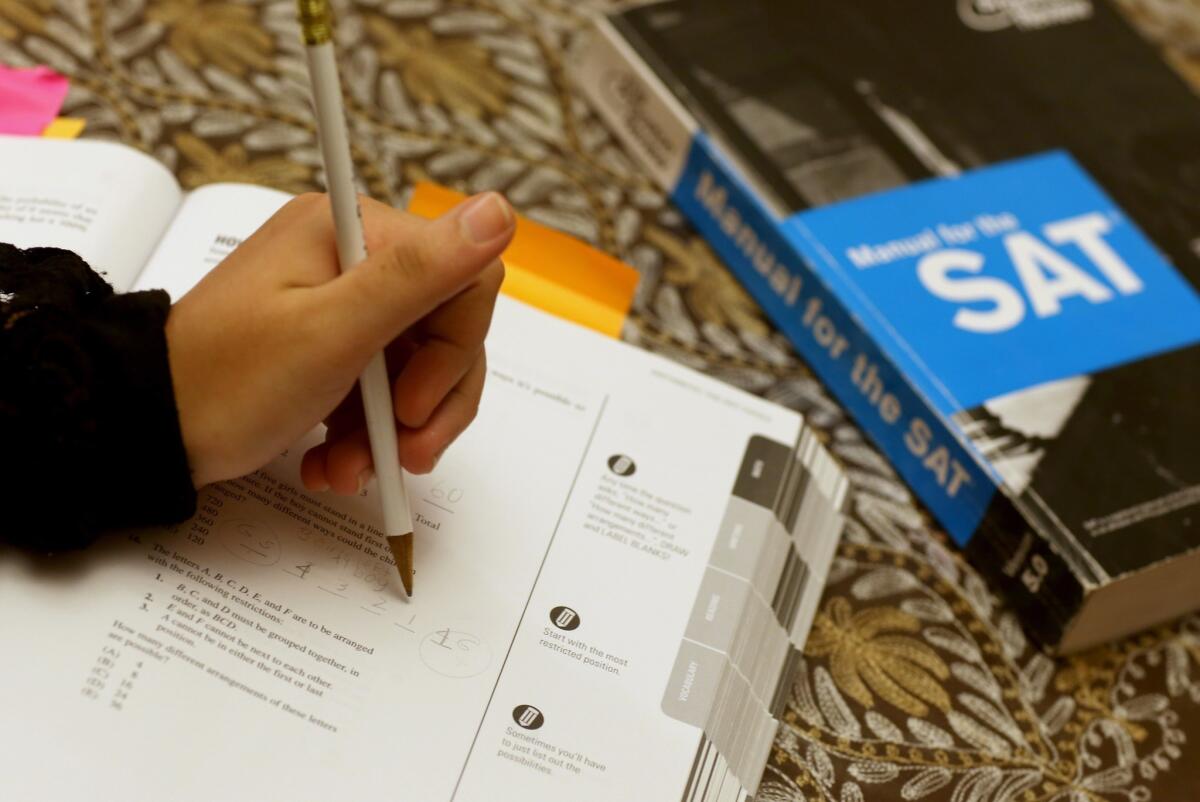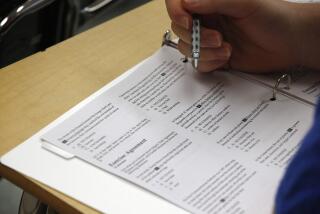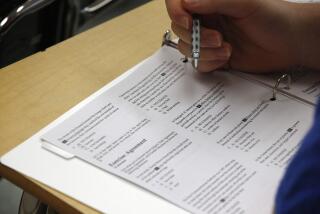Ban the use of high-end calculators that give students ‘the edge’ on the SAT

- Share via
As colleges across the country debate whether to require standardized tests as part of college admissions on account of their perceived bias against low-income students and students of color, there is a built-in bias in SAT test-taking that seemingly no one is talking about.
As a high school sophomore, I learned this the hard way last year, when a student I didn’t expect to bested me on the math PSAT. He soon confessed the secret to his success: the TI-Nspire CAS Graphing Calculator from Texas Instruments.
The College Board, which owns the SAT, allows an array of relatively expensive niche calculators to be used on part of the test. The most advanced calculator can save experienced users time solving the more complex problems. Those calculators have the potential to enhance the test scores of students who can afford them. Their use puts all other test-takers at a disadvantage, some of whom take the SAT without a calculator.
My fellow test-taker made clear that the TI-Nspire was able to solve all of his SAT equations. He claimed all he needed was his knowledge of seventh-grade math and the calculator did the rest.
From experience, I know it isn’t that simple. A fancy calculator that costs about $150 is not that useful if you don’t understand what the question is asking. And it probably can’t help a student who has a poor foundation in math.
Ethical considerations aside, I had to try the TI-Nspire and was lucky enough to afford it. After it came in the mail, I shrieked with glee as I solved problems in record time. My days of self-calculating for x and y on standardized tests were over.
In technical terms, the TI-Nspire calculator has a computer algebraic system (known as CAS) that essentially allows a person to use the calculator as a computer. Equations and notes can be stored for use during the test, and the calculator can solve all complex equations input by the user.
As the company TestPrepHQ says: “It almost feels like cheating” because the calculator makes it so easy.
It does feel like cheating. Within seconds of opening the box, it was obvious to me that this calculator should be banned from SAT testing.
Aside from being financially out of reach of many students, CAS calculators have the potential to misrepresent math ability and problem-solving skills.
The wonders of the TI-Nspire and others like it are well known to those who specialize in SAT performance, and message boards and blogs are filled with recommendations. Conquer Your Exam calls it “the best out of the bunch” of calculators the site recommends and says it “can give you the edge during the SAT.”
In my large public high school in Idaho, many students take the SAT without a calculator mainly because they don’t realize they can use one or they can’t afford one. I became aware of this last year when a girl in my exam room raised her hand and asked to borrow a calculator for the test. She was told none were available and that she didn’t need one.
Recognizing this problem, my school recently sought donations to purchase basic $8 calculators for use in testing — a good move, since over 200 students at my school alone showed up last fall to take the PSAT without a calculator.
It’s unfair to allow such an incredibly helpful advanced calculator unless every student has access to it. Especially when the test has the potential to affect a student’s educational trajectory.
In response to an email asking whether the College Board is aware that the TI-Nspire is seen as greatly helping those who use it and whether it has considered banning such calculators, a communications officer sent a link to the SAT calculator policy, which spells out the permitted calculators. Seven models of the TI-Nspire CAS are on the College Board’s list. The ACT, which competes with the College Board for test-takers, prohibits calculators with CAS functionality.
PrepScholar, a popular website for students hoping to attend selective colleges, points out that the College Board’s calculator policy “says that you don’t need a calculator for the SAT. They say that because the College Board needs to make the SAT seem accessible to people of all income levels. ... A calculator, and the right calculator at that, is an absolute must.”
If all students had access to a better calculator, how many could improve their test scores enough to get into their dream school? How many students get in to better schools because of this privilege hack? It isn’t right and shouldn’t stand.
The simplest solution would be to eliminate the math section that allows calculator use or permit test-takers to use only the most basic calculators, provided by the College Board.
Before the next round of SAT testing begins in March, CAS calculators such as the TI-Nspire should be banned and an effort made to arm every test-taker with a calculator.
The equation for fairness is simple: You know it when you see it, and this calculator inequity isn’t it.
Lilian Smith is a high school junior in Coeur d’Alene, Idaho.
More to Read
A cure for the common opinion
Get thought-provoking perspectives with our weekly newsletter.
You may occasionally receive promotional content from the Los Angeles Times.






